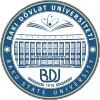Based on the decision of the Scientific Council of BSU dated July 11, 2023, and Subparagraph 3.1.21 of the "Charter of Baku State University" approved by the Cabinet of Ministers of the Republic of Azerbaijan on April 16, 2019, Decision No. 172, the Rector’s Order No. R-96 dated July 12, 2023, established the Quality Assurance Center and its subordinate Monitoring, Analysis, and Accreditation Department.
Main Activity Directions of the Department
- Participating in the formation, review, implementation, and monitoring of policies and procedures aimed at quality assurance and development, as well as in the process of establishing a culture of quality.
- Contributing to the effective organization of quality assurance activities.
- Monitoring the activities of structural units, the organization of teaching, the implementation of educational programs, internationalization, and scientific research activities.
- Conducting various surveys among stakeholders and analyzing the results.
- Performing annual self-assessments for institutional and/or program accreditation and monitoring the implementation of recommendations provided post-accreditation.
- Organizing and coordinating activities related to the international accreditation of specializations and/or specializations in collaboration with other structural units.
Main Responsibilities of the Department
- Participating in the preparation, updating, improvement, and implementation of quality assurance policies involving stakeholders based on an appropriate action plan.
- Organizing processes for monitoring the quality of educational program documents (course syllabi and curricula) and educational-methodical materials.
- Organizing processes for monitoring the activities of structural units, the organization of teaching, the implementation of educational programs, scientific research, and internationalization efforts.
- Organizing satisfaction surveys among stakeholders (students, educators, alumni, etc.) and analyzing the results.
- Organizing processes to evaluate the effectiveness of student support services (medical, psychological, tutoring, dormitory, cafeteria services, etc.).
- Ensuring the accountability of structural units based on institutional and program accreditation evaluation criteria and conducting annual self-assessments.
- Supervising the activities of the Organizational Commission and the self-assessment process during institutional and/or program accreditation evaluations.
- Organizing the monitoring of the implementation of recommendations provided post-accreditation.
- Studying international and local best practices in quality assurance and ensuring their implementation in the local context.
- Organizing regular monitoring of transparent, objective, student-centered, and competency-based knowledge assessment.
- Promoting academic integrity, protecting academic independence, and organizing the evaluation of measures against plagiarism.
- Participating in the preparation of analytical materials and/or guidelines relevant to the Department’s functions.
- Organizing and coordinating the activities of relevant committees and/or working groups formed in line with the Department’s responsibilities.
- Organizing the international accreditation process for specializations and/or specializations and submitting applications for considering positive accreditation decisions in state accreditation.
- Coordinating activities for international program accreditation of specializations in collaboration with other structural units.
- Ensuring proper reporting of activities in accordance with established rules and at specified intervals.
- Performing other functions assigned by the Rector within the authority specified in this Charter.
Main Rights of the Department
- Requesting relevant information from structural units, reviewing the provided information, and ensuring its reliability, validity, and sufficiency while demanding corrections if necessary.
- Preparing and submitting proposals to enhance the efficiency of the quality assurance system.
- Conducting planned and unscheduled monitoring in relevant structural units.
- Forming committees and/or working groups for organizing the Department’s work.
- Conducting individual or collective verbal hearings and discussions on quality assurance.
- Requesting reports from relevant structural units on the implementation of recommendations issued post-monitoring.
- Providing recommendations to structural units for eliminating deficiencies identified during monitoring.
- Recommending measures to enhance the quality of work (services) to structural unit heads.
- Engaging relevant structural units and other stakeholders in implementing these measures.
- Accessing workplaces, classrooms, and laboratories as necessary to conduct supervision and evaluation activities without hindrance.
- Conducting official correspondence within the framework of its authority.

